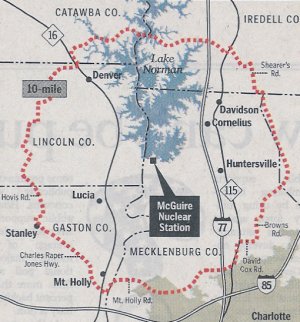|
North
Carolina to Give Pills Against Radiation
Potassium
iodide could protect against thyroid cancer in case of radiation exposure Paraphrased
by Steve Waldrop
October 25, 2002 Nearly
165,000 people living with 10 miles of the Charlotte area's nuclear plants are
elligible to receive two tiny salt pills later that could help save their lives
in a radiation disaster.
North Carolina counties in the Charlotte area
will distribute free potassium iodide pills from the federal government in October.
Times and places where residents can pick up tablets will be announced later.
Officials in South Carolina say that they haven't decided whether to offer the
pills, which can prevent thyroid cancer caused by radiation. Other N.C. counties
near nuclear plants will make their own plans for distribution.
The pills
don't block all potentially harmful radiation from a nuclear accident. So officials
warn that taking potassium iodide, known as KI, shouldn't make people feel safe.
They still need to evacuate if officials tell them to.
'" This is
a very small silver of protection," said Mecklenburg Health Director Peter
Safir.
 People
living more than 10 miles from the plants, aren't eligible for the free pills,
although they might be vulnerable to radiation. Studies suggest that a major nuclear
accident might increase the risk of thyroid cancer more than 100 miles away. People
living more than 10 miles from the plants, aren't eligible for the free pills,
although they might be vulnerable to radiation. Studies suggest that a major nuclear
accident might increase the risk of thyroid cancer more than 100 miles away.
Mecklenburg
County health officials say they've alerted major pharmacy chains that they might
want to increase their local supplies in case they see more demand in the coming
weeks. The Carolinas
have a dozen nuclear plants, including McGuire on Lake Norman and Catawba on Lake
Wylie, both in North Carolina.
Mecklenburg, Gaston, Catawba, Iredell and
Lincoln counties will receive 350,000 pills from the NRC stock. Mecklenburg officials
expect fewer than half the eligible residents to want them. If they run low, however,
local officials may ask for more.
People who work within 10 miles of the
plants will be offered the pill later, officials aren't sure when.
Potassium
iodide is "not very different in its chemical structure from table salt,"
said Dr. Stephen Keener, Mecklenburg County's medical director. Table salt doesn't
protect against radiation.
The pills will come with instructions and should
not be taken unless a disaster occurs. Officials will make an announcement telling
residents when to use them.
Some people are allergic to iodide, and others
can suffer minor side effects, such as rashes. Officials urge people who receive
the pills to check with their doctor if they're not sure it's OK for them.
 KI
can be given to people of all ages, although newborns younger than 1 month should
only take an eight of a pill. Infants and children, who have more active thyroid
glands than adults, are at particular risk of thyroid cancer in a radiation-spewing
disaster. KI
can be given to people of all ages, although newborns younger than 1 month should
only take an eight of a pill. Infants and children, who have more active thyroid
glands than adults, are at particular risk of thyroid cancer in a radiation-spewing
disaster.
Potassium iodide received Food and Drug Administration approval
in 1982, three years after the Three Mile Island nuclear accident in Pennsylvania.
For years, health experts urged federal, state and local officials to stockpile
the pills for emergency civilian use. But it took the September 11 terrorist attack
to convince the NRC to act.
Until recently, both Carolinas kept small KI
stockpiles- enough to protect only emergency workers and civilians, who could
not evacuate quickly, such as hospital patients and prison inmates.
Distribution
after a disaster also was a concern, officials would prefer to see residents evacuate
rather than stand in line for pills- which is why they decided to distribute them
to residents now, rather than storing them to pass out after an event.
"Potassium
iodide is not a substitute for evacuation in an emergency," Keener said.
"That is the No. 1, 2 and 3 priority." But
evacuating everyone within 10 miles of the McGuire or Catawba plants could take
at least eight to 24 hours, according to local emergency plans. Less than four
hours is considered optimal by the federal government.
The worst kind of
nuclear accident could release enough radiation within a few hours to pose a potential
cancer risk for people nearby. The chance of that happening, the NRC says, is
very low. |

